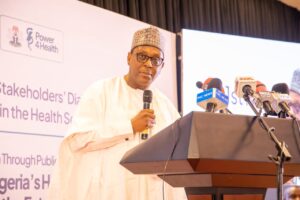Tinubu Prioritizes Stable Power Supply for Tertiary Healthcare Facilities
President Bola Ahmed Tinubu said fixing the power crisis in Nigeria’s hospitals is now a national priority, describing unreliable electricity in health facilities as a life-threatening challenge that demands urgent action.
The President who was represented by the Secretary to the Government of the Federation, Senator George Akume at the maiden National Stakeholders’ Dialogue on Power in the Health Sector held on Tuesday in Abuja, affirmed that reliable and affordable power is central to improving healthcare delivery and restoring public confidence in the system.
The President commended the collaboration between the Federal Ministries of Health and Power, noting that it testifies to the present administration’s resolve to promote synergy amongst MDAs.
Alaba Balogun, Head of Information and Public Relations, Ministry of Health, in a statement disclosed that President Tinubu highlighted that the collaboration would deliver sustainable solutions to electricity challenges in the health sector.
Elaborating further, he described the persistent power supply crisis in Tertiary hospitals as a crisis that demands urgent and immediate action to save lives.
“In surgical theatres, maternity wards, intensive care units, laboratories, and emergency rooms across the country, power outages too often compromise safety, interrupt care, and cost lives. These outages cannot continue, and under our administration, they should not. Lives are at stake. We must act now,” Tinubu declared.
He emphasized that tackling energy challenges in hospitals is a key objective of the dialogue and a crucial part of his Renewed Hope Agenda. This agenda prioritizes addressing energy poverty, decentralizing energy supply, and promoting private sector participation.
Through the Energy Transition Plan and power sector reforms, the government aims to implement off-grid solar and hybrid systems in health facilities, attract private investment, and utilize blended financing with development partners.”
Tinubu challenged health institutions to adopt sustainable, community-owned systems rather than temporary fixes and urged stakeholders to turn dialogue into measurable action.
“This dialogue must not be a talk shop. It must yield actionable outcomes—alignment of policies, institutionalisation of energy audits in hospitals, mobilisation of social and green financing, and establishment of a results-driven accountability framework,” he said.
The President congratulated the Health and Power Ministers for convening the dialogue, assuring them of his full political support.
“The success of this initiative will not be measured by the speeches we deliver but by the uninterrupted light in our hospitals, the hum of functioning equipment, and the renewed confidence of every Nigerian who walks into a public health facility,” Tinubu stated.
Other speakers at the dialogue underscored the urgency of the intervention.

Prof. Ali Pate highlighted that power and connectivity remain the two missing links in Nigeria’s health transformation, stressing the need for partnerships to mobilise private capital through Public-Private Partnerships.
Dr. Iziaq Adekunle Salako warned that unreliable electricity is the second biggest barrier to healthcare delivery after funding gaps, citing a BudgIT survey. He urged stakeholders to act collectively, noting: “Every time a hospital is plunged into darkness, lives are put at risk. Powering health is not optional—it is essential for our survival.”
This is therefore the time to be creative as we move to develop and adopt smart energy solutions that will strengthen our health system and empower us to deliver on our core mandate of improving population health outcomes” ; he added
On his part, Minister of Power, Chief Adebayo Adelabu described the event as a turning point in linking energy and health, highlighting reforms under the Electricity Act 2023, the National Integrated Energy Policy, and renewable transition projects, including solar mini-grids for healthcare centres.
Earlier, Daju Kachollom, Permanent Secretary of the Health and Social Welfare Ministry, emphasized the critical importance of electricity in the nation’s hospitals, describing it as “a matter of life, dignity, and hope”.
The theme “Powering Health Through Public-Private Synergy: Energising Nigeria’s Health Sector for the Future”, she stated, captures the essence of ensuring that every Nigerian, regardless of geography or circumstances accesses affordable healthcare supported by reliable and sustainable power.
The two-day dialogue will draw to a conclusion today 10 September 2025, with series of technical sessions lined up as outlined in the Programme.
